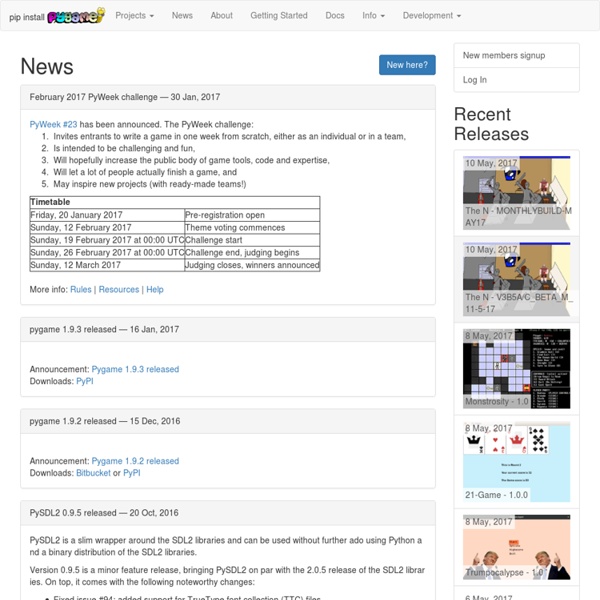pyquery
pyquery allows you to make jquery queries on xml documents. The API is as much as possible the similar to jquery. pyquery uses lxml for fast xml and html manipulation. This is not (or at least not yet) a library to produce or interact with javascript code.
Python Library
From OSGeo Wiki Motivation Several OSGeo software projects support Python. However, a global abstraction layer is lacking which would help to do "OSGeo Python programming". We think of well documented bindings to the various software projects which are handled as plugins (or whatever appropriate). Functionality
Pupil
Pupil is an eye tracking hardware and software platform that started as a thesis project at MIT. Pupil is a project in active, community driven development. For noncommercial use, the hardware is accessible, hackable, and affordable. The software is open source and written in Python and C where speed is an issue. Our vision is to create a tool kit for a diverse group of people interested in learning about eye tracking and conducting their eye tracking projects. Headset
PyQL : a new set of Python wrappers for QuantLib | Things and thoughts
Hi folks, We are happy to announce the release of PyQL [1], a new set of Python wrappers for QuantLib. The project is available here : * URL: * License: BSD license. * Authors: Didrik Pinte, Enthought and Patrick Henaff, IAE Paris.
TextBlob: Simplified Text Processing — TextBlob 0.6.0 documentation
Release v0.8.4. (Changelog) TextBlob is a Python (2 and 3) library for processing textual data. It provides a simple API for diving into common natural language processing (NLP) tasks such as part-of-speech tagging, noun phrase extraction, sentiment analysis, classification, translation, and more. TextBlob stands on the giant shoulders of NLTK and pattern, and plays nicely with both.
Documentation
QuantLib reference manual [HTML] The reference manual is also available for offline reading from the SourceForge download page
Machine Learning Cheat Sheet (for scikit-learn)
As you hopefully have heard, we at scikit-learn are doing a user survey (which is still open by the way). One of the requests there was to provide some sort of flow chart on how to do machine learning. As this is clearly impossible, I went to work straight away. This is the result: [edit2] clarification: With ensemble classifiers and ensemble regressors I mean random forests, extremely randomized trees, gradient boosted trees, and the soon-to-be-come weight boosted trees (adaboost).
1.4. Matplotlib: plotting — Scipy lecture notes
1.4.2. Simple plot Tip In this section, we want to draw the cosine and sine functions on the same plot. Starting from the default settings, we’ll enrich the figure step by step to make it nicer.
ly | Online graphing and data analysis
plotly Scientific Graphing and Data Analysis, all online. Plotly lets you analyze data and create scientific graphs, all online and for free. Graphs and datasets can then be shared seamlessly with classmates, teachers, lab mates, or within your organization. Check out our features and see what Plotly can do for your classroom or company. Sign in with Google I already have a Plotly account
Open Source Finance 1. QuantLib - An Interview with Luigi Ballabio
This is the first in a new series of interviews with leading developers involved in open source financial software. In the first interview I talk to Luigi Ballabio about QuantLib, a free software framework for Quantitative Finance which he has been involved with since it's original launch in the year 2000. Luigi currently participates in the design, maintenance and development of the core C++ library for QuantLib, including the review and management of the contributions from users.



